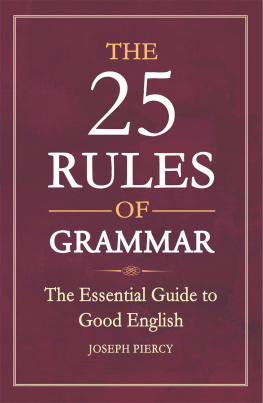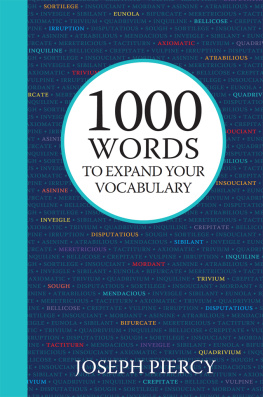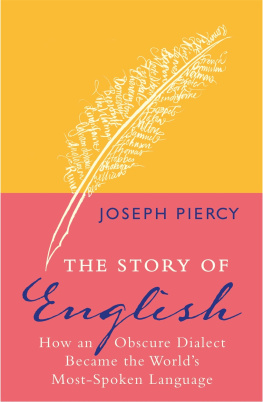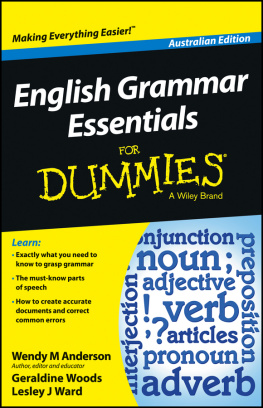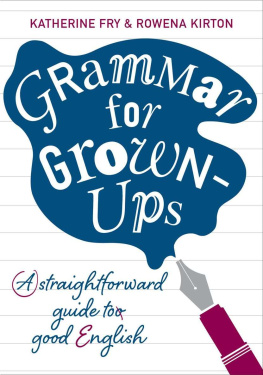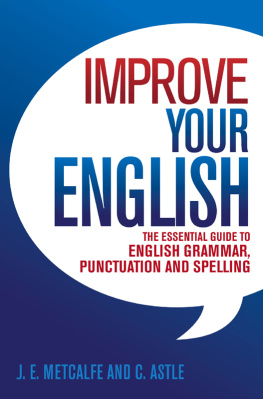Joseph Piercy - The 25 Rules of Grammar: The Essential Guide to Good English
Here you can read online Joseph Piercy - The 25 Rules of Grammar: The Essential Guide to Good English full text of the book (entire story) in english for free. Download pdf and epub, get meaning, cover and reviews about this ebook. year: 2014, publisher: Michael OMara Books, genre: Home and family. Description of the work, (preface) as well as reviews are available. Best literature library LitArk.com created for fans of good reading and offers a wide selection of genres:
Romance novel
Science fiction
Adventure
Detective
Science
History
Home and family
Prose
Art
Politics
Computer
Non-fiction
Religion
Business
Children
Humor
Choose a favorite category and find really read worthwhile books. Enjoy immersion in the world of imagination, feel the emotions of the characters or learn something new for yourself, make an fascinating discovery.
- Book:The 25 Rules of Grammar: The Essential Guide to Good English
- Author:
- Publisher:Michael OMara Books
- Genre:
- Year:2014
- Rating:3 / 5
- Favourites:Add to favourites
- Your mark:
- 60
- 1
- 2
- 3
- 4
- 5
The 25 Rules of Grammar: The Essential Guide to Good English: summary, description and annotation
We offer to read an annotation, description, summary or preface (depends on what the author of the book "The 25 Rules of Grammar: The Essential Guide to Good English" wrote himself). If you haven't found the necessary information about the book — write in the comments, we will try to find it.
The 25 Rules of Grammar: The Essential Guide to Good English — read online for free the complete book (whole text) full work
Below is the text of the book, divided by pages. System saving the place of the last page read, allows you to conveniently read the book "The 25 Rules of Grammar: The Essential Guide to Good English" online for free, without having to search again every time where you left off. Put a bookmark, and you can go to the page where you finished reading at any time.
Font size:
Interval:
Bookmark:

By the same author:
The Story of English
Symbols
As Alain Stephen:
This Book Will Make You Think
Why We Think the Things We Think

First published in Great Britain in 2014 by
Michael OMara Books Limited
9 Lion Yard
Tremadoc Road
London SW4 7NQ
Copyright Michael OMara Books Limited 2014, 2016
All rights reserved. No part of this publication may be reproduced, stored in a retrieval system, or transmitted by any means, without the prior permission in writing of the publisher, nor be otherwise circulated in any form of binding or cover other than that in which it is published and without a similar condition including this condition being imposed on the subsequent purchaser.
A CIP catalogue record for this book is available from the British Library.
ISBN: 978-1-78243-602-7 in paperback print format
ISBN: 978-1-78243-231-9 in hardback print format
ISBN: 978-1-78243-268-5 in e-book format
Cover design by Ana Bjeanevi
Designed and typeset by K. DESIGN, Winscombe, Somerset
www.mombooks.com
This book is dedicated to my friend Rainer.
If he were alive he would be amused.
Rainer Lange
(19642008)
Who climbs the grammar tree, distinctly knows
Where noun, and verb, and participle grows.
John Dryden
(16311700)


My heartfelt thanks to the following people for their kindness, patience and fortitude in the creation of this book:
Firstly to Louise Dixon for getting the project off the ground in the first place and her kindly advice and encouragement, and Gabriella Nemeth, an absolute dream of an editor skilful, diplomatic, and in possession of almost limitless resources of patience. Id also like to thank the staff at Sussex University Library and Hove Library; R. Lucas and James Fleet and most of all my family and friends for putting up with my tiresome pedantry about all things grammar, particularly Joanna and my daughter Polly. I have dedicated this book to my friend Rainer Lange, a German national who loved to correct the English on their English.


Yes. It does. Matter. Because how, wood you under stand; what I is saying?
My personal experience of grammar lessons at school was, at best pretty torpid and, at worst downright arduous. This scale encouraged neither interest or learning. I only really became very totally interested in grammar when training to become an EFL teacher. Although English hadnt not become my subject; Id flirted with being an artist (couldnt draw) and a musician (couldnt play an instrument) and I liked reading books. Lots of books. You can never have enough books. And real books too!
Eagle-eyed grammarians would argue that the last sentence of the previous paragraph isnt a sentence. And they wouldnt not be right. After a fashion. But I am better now than I were before...
Shall I start again?
Does grammar really matter? Well, I have tried to break as many grammatical rules in the opening to this introduction as possible to see if anybody notices. It is a Wheres Wally? of grammar errors but, although it reads a touch like experimental fiction in parts, it is fairly coherent.
The current trends in English grammar fall into two schools. On one side are the prescriptivists, the Olde School, those who phone in to the BBC to complain about minor errors in news reports on national television and radio. On the other side are the descriptivists, the New Skool, those who feel that language is always evolving and that therefore grammar should evolve too. Fundamentally, the argument comes down to one sticking point about the nature of how language actually functions. Is usage determined by grammatical rules? Or are grammatical rules defined by usage?
In order to function as a practical means of communication a language needs a vocabulary and a grammar. Every written language in the world has a grammatical structure, rules that govern, determine and define how meaning is produced. This seems more than plausible and, although I started this introduction by trying to deliberately flout (not flaunt) the rules, precision in thought and, by extension, clarity of expression are important.
On the other hand, there is a counter-argument that if people keep making the same mistakes, over and over again, after a while it is no longer a mistake but becomes commonplace and therefore correct. It is certainly true that lots of grammatical forms: words, moods and structures, have fallen out of general usage. The use of shall, for example, as a future form has been reduced to little more than polite requests or offers (Shall we go to the pub?; Shall I buy you a drink?) in the last century and a half. Other words such as forensic have taken on a whole new meaning in less than thirty years. Forensic was originally a legal term that had nothing at all to do with cutting up the dead bodies of murder victims; it means simply the practice of rhetoric associated with legal matters, the presentation of argument supported by evidence in a court of law. On any given day you can turn on the television and a crime drama will talk about the need of getting the forensics in order to achieve an arrest and probable conviction. They only actually need the forensics in court, they dont need them beforehand as it is a matter of rhetoric, not minute skin fibres or complicated DNA test results.
The English language has lots of rules, over 2,000 to be imprecise. Some of these rules are archaic and arguably unnecessary. The first attempts at writing down the essential rules of grammar surfaced in the mid-eighteenth century. Bishop Robert Lowths A Short Introduction To English Grammar (1762) proved extremely popular at the time and unbeknown to the kindly, but somewhat pedantic clergyman, set in motion arguments on correct and incorrect usage that still rage on to this day. Lowth was directly responsible for several of the grammatical shibboleths analysed in this book; some of them still hold true but at least one of them is at best outmoded and at worst, bogus in the first place. The irony concerning Robert Lowths influence on English grammar is that his book was written as a guide to correct English usage for his son Thomas and was never intended to be published, let alone spark centuries of argument and rancour.
Lowths rules were taken up by a whole generation of Victorian grammarians, who followed his ideas that you could apply the grammatical rules of Latin to modern English. Unfortunately, this rather spurious premise has caused the entire furore. The Olde School stick to the rules stringently as a badge of status and superiority over the New Skool whom they believe are ill-educated and only semi-literate. The New Skool, with some justification, view their detractors as stuffy, elitist snobs.
Next pageFont size:
Interval:
Bookmark:
Similar books «The 25 Rules of Grammar: The Essential Guide to Good English»
Look at similar books to The 25 Rules of Grammar: The Essential Guide to Good English. We have selected literature similar in name and meaning in the hope of providing readers with more options to find new, interesting, not yet read works.
Discussion, reviews of the book The 25 Rules of Grammar: The Essential Guide to Good English and just readers' own opinions. Leave your comments, write what you think about the work, its meaning or the main characters. Specify what exactly you liked and what you didn't like, and why you think so.

